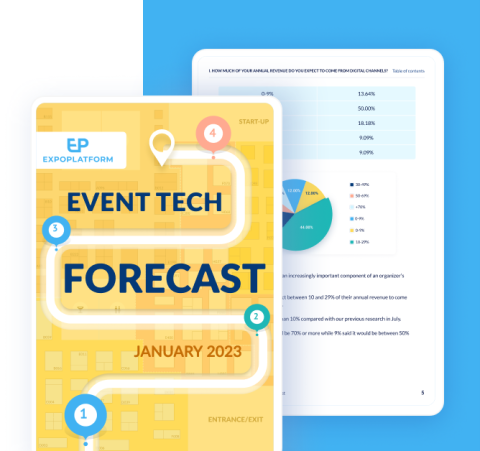ExpoPlatform Releases Event Tech Forecast 2023

ExpoPlatform, which uses AI-powered solutions to build events, communities and marketplaces across in-person, virtual and hybrid channels, unveiled the Event Tech Forecast 2023. The report focuses on how the digital evolution of the industry will shape businesses this year and features exclusive findings from professionals and expert insights from top contributors.
The four sections of the report include:
- The amount of annual revenue expected to come from digital channels
- The biggest windows of opportunity for event technology
- The most important challenges facing event professionals
- The key ways event tech is helping the industry
The Event Tech Forecast 2023 comes amid a huge return to live events over the last 12 months, with many organizers now recognizing digital as a key part of their offerings, according to Conor Riordan, content editor at ExpoPlatform.
“The events industry is going through a digital renaissance, with participants in live shows now expecting their experiences to be fueled by technology,” Riordan said. “The [report’s] findings reveal that organizers too are seeing this as crucial to their business models as a way to increase revenue and reach and improve offerings.”
He added, “Our study highlights some of the challenges planners will face in getting to grips with this new landscape, while also giving advice from an expert panel about how to make the most of any opportunities.”
Digital Revenue
Half of event professionals surveyed for the study now expect between 10% and 29% of their annual revenue in 2023 to come from digital channels, an increase of more than 10% compared with ExpoPlatform’s previous research in July 2022. Additionally, 9% of respondents believe digital channels will account for 70% or more of revenue, and 9% expect it to be between 50% and 69%.
Meanwhile, more than have of respondents predict digital revenue to increase in 2023, 32% believe it will remain the same, and 5% think it will decrease.
Windows of Opportunity for Event Tech
The study revealed several areas where event tech will play a key role, with community nurturing for engagement, revenue and reach at the top of the list, according to 64% of respondents. Other areas include providing exhibitor ROI (50%), digital monetization (50%) behavioral metrics (36%), mass personalization (36%) and product discovery (14%).
Key Challenges
The survey includes the top challenges facing event professionals, with a seamless experience across platforms as the biggest, according to 59% of respondents, followed by good exhibitor ROI (55%), integration between suppliers (55%) and lack of skilled resources (55%). Other obstacles reported include smooth exhibitor onboarding (36%) and audience levels (32%).
Top Uses for Event Tech
Event professionals surveyed chimed in on 10 key ways they are using event tech, including:
- Event mobile app (64%)
- AI matchmaking (50%)
- Lead retrieval (50%)
- Community and marketplace (45%)
- Interactive floorplan (45%)
- On-demand content for post-event (41%)
- Simultaneous hybrid streaming (32%)
- Self-service exhibitor stands (28%)
- Hosted buyer meetings (23%)
- Location-based notifications and analysis (18%)
For more details on the report’s findings and to receive insights and advice from industry experts, click here to download a free copy of the Event Tech Forecast 2023.
Don’t miss any event-related news: Sign up for our weekly e-newsletter HERE, listen to our latest podcast HERE and engage with us on Twitter, Facebook, LinkedIn and Instagram!


Add new comment